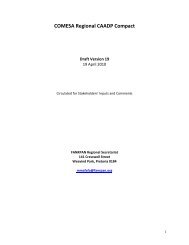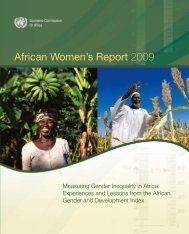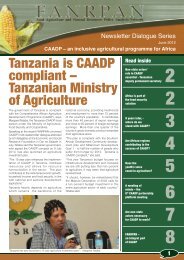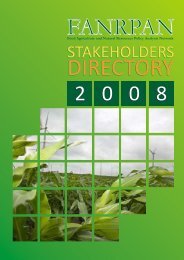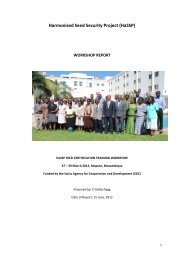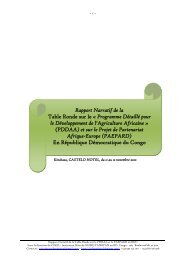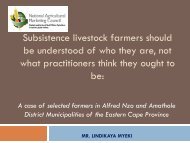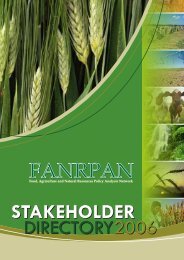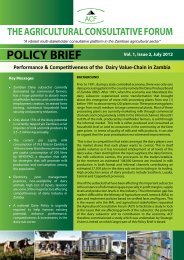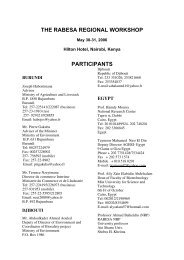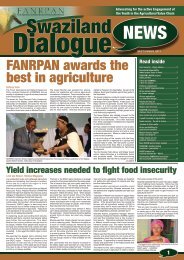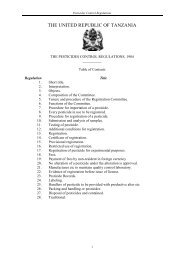Community-driven development decision tools for rural - IFAD
Community-driven development decision tools for rural - IFAD
Community-driven development decision tools for rural - IFAD
- No tags were found...
Create successful ePaper yourself
Turn your PDF publications into a flip-book with our unique Google optimized e-Paper software.
contribution to building a sustainable system. 41 It is the only option in which government wantsto retain tight centralized control over the <strong>rural</strong> <strong>development</strong> process.Channelling funds through the local government merges the resources allocated to supportcommunity initiatives with the general budget of the devolved local governments. This approachmust use conditional IGFTs that spell out the purpose of the transfer and the conditions <strong>for</strong> itsuse. It is good practice <strong>for</strong> the central government to require the devolved local governments toestablish a dedicated “window” to handle these funds and keep separate accounts.To transfer funds to CSOs of public utility, government establishes a central unit thatnegotiates with the CSOs, transfers the funds and monitors and evaluates their per<strong>for</strong>mance.Experiences with channelling funds through local governments or transferring funds to CSOsvary with different cooperation agencies around the world. Choosing one or the other isinfluenced by local conditions and by the preference to either strengthen decentralization of thepublic administration or to establish a complementary, competitive and diversified deliverysystem to reach the <strong>rural</strong> community through networks of CSOs. In several countries of LatinAmerica, municipal budgets have been successfully used by both <strong>IFAD</strong> and the World Bank torespond to community demand <strong>for</strong> social and production infrastructure. In India, the WorldBank implements its CDD approach to a large extent through national NGOs that operate with agreat deal of autonomy at the community level. In WCA, <strong>IFAD</strong> has experimented with bothsolutions, channelling funds through local governments in Burkina and Ghana and transferringfunds to CSOs in Cape Verde, Mali and Mauritania.The financial sustainability of either solution depends to a very large extent on the capacity tomaintain a steady flow of funding that supports the CBOs. Receiving public funds after the endof an externally financed CDD project depends on the government’s willingness and capacity tonegotiate repeater external loans with similar objectives and/or on its priority <strong>for</strong> using its ownfiscal resources.Using private fundsIn determining arrangements <strong>for</strong> the flow of funds, CDD project designers tend to focusalmost exclusively on public funding. However, this is by no means the only source ofsustainability <strong>for</strong> CDD initiatives. There is potential to attract resources from sources otherthan government (e.g. the communities and national and <strong>for</strong>eign private philanthropicorganizations). It would be wrong to disregard these opportunities because privatecontributions may be significant, particularly in small countries. The example described in Box35 is only one; another is the case where resources were transferred by communities ofemigrant workers to areas in northern Mali and Senegal.Though private funds can be, and actually are occasionally, made available to both publicand private organizations, philanthropic organizations may prefer to deal with civil societyorganizations having similar objectives and culture, if they exist and have a reliable record. Itis thus important to find ways of linking the philanthropic organizations with the CSOs ofthe South.From an institutional point of view, would the local government channel be more sustainablethan a CSO of public utility? It is sometimes argued that sustainability is ensured only byorganizations that are <strong>for</strong>mally part of the government. There<strong>for</strong>e the only sustainable solution isto establish a public unit at the central, district or provincial level to fund communitysubprojects. This is a spurious argument because government organizations can be suppressed,left to decay or given different mandates. The same can be said of other options as well. CSOs ofpublic utility that depend exclusively on government funding may be liquidated when41 Such a solution may be the only realistic option at the very beginning of the <strong>development</strong> process (e.g. the <strong>IFAD</strong> MauritaniaOASIS I) but it should be discontinued as soon as there are realistic opportunities to develop more lasting arrangements.73



